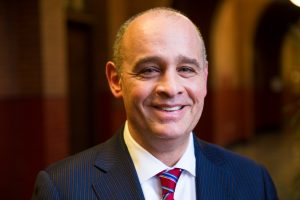Rosario Ceballo, a leading scholar in diversity, equity, and inclusion work and former chair of the University of Michigan’s Women and Gender Studies (WGST) Department, was appointed as dean of Georgetown College. Her appointment comes as Georgetown’s equivalent WGST program faces an uncertain future.
Ceballo, who was appointed on July 27, previously served as professor of psychology and women’s and gender studies, as well as associate dean for the social sciences at Michigan’s College of Literature, Science, and the Arts. At Georgetown, she will also be teaching psychology in addition to her administrative duties. Ceballo will begin her position on Jan. 1, 2022, taking over from Interim Dean Soyica Colbert.
Notably, Ceballo’s career has been based in WGST-related work. She served as the chair of Michigan’s department from 2015-2018, and her scholarship partially focuses on the difficulty women of color have obtaining reproductive healthcare. She also aided in developing a new gender and health major for the department. This interdisciplinary approach has been central to Ceballo’s career, she told Georgetown.
“I believe we can best confront our greatest social problems from a range of diverse perspectives and areas of expertise, as is represented among the exceptional faculty and students at Georgetown,” she said.
Though Ceballo worked in a WGST Department at Michigan, she will not have the same opportunity at Georgetown; despite years of support from students for a full department, WGST on the Hilltop is still just a program. Though the program recently got a new director in Nadia Brown, who hopes to build out its fellowship and course offerings, its less-than-full status still causes concern for students. Additionally, one of the program’s signature offerings, the Title IX for a New Generation class, was discontinued for this fall, though Brown hopes to offer it again in the spring.
Following Ceballo’s announcement, students questioned online what this could mean for the program, pointing out the irony in hiring a leading scholar in a subject Georgetown does not house under a department.
Georgetown’s announcement also lauded Ceballo’s work on diversity, equity and inclusion, which included helping first-generation low-income students get access to university resources, and hire and retain a more diverse faculty. Her research has also called attention to community violence and poverty, with a recent study focusing on the impacts on Latino families. Ceballo promised to bring some of that work to Georgetown, which has in the last year made several public commitments to improve racial justice at the university, though many programs are still nascent.
“While we can all agree that diversity is part of our academic excellence and we know that excellence in research is not in tension with our commitments to diversity, we still have much to do to fully incorporate diversity, equity, and inclusion into higher education,” Ceballo told the university.







